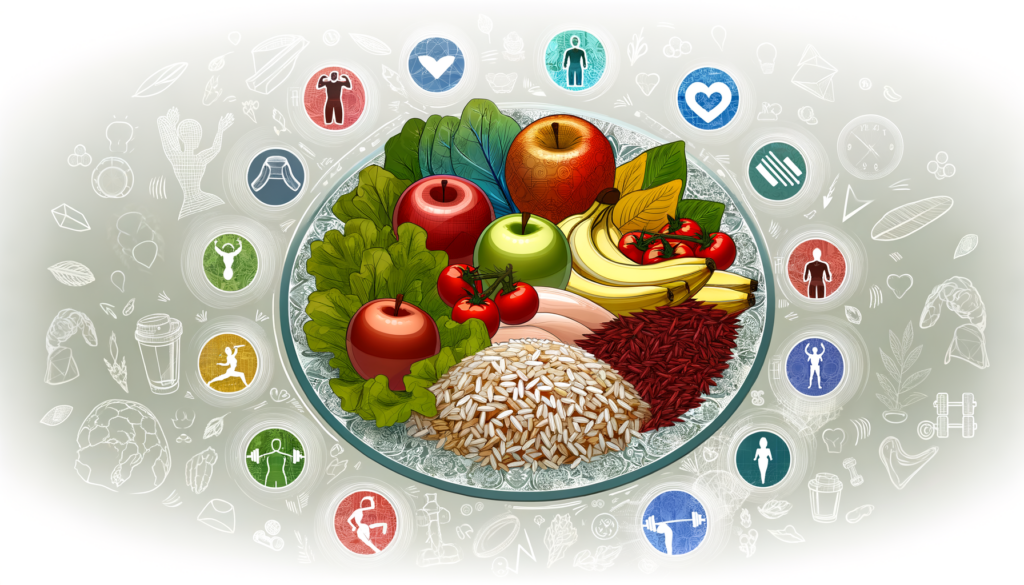Understanding the Interplay Between Hormones and Caloric Intake
When it comes to managing weight and overall health, many factors come into play, including hormones, diet, and caloric intake. Hormones play a crucial role in regulating appetite, food cravings, and fat storage, making them a key component in any weight management strategy. In this article, we will explore how integrating hormone-balancing diets with calorie tracking can lead to a more holistic and effective approach to health and wellness.
The Role of Hormones in Weight Management
Hormones such as cortisol, estrogen, insulin, serotonin, melatonin, and testosterone significantly influence hunger signals and fat storage in the body. For example, cortisol, the stress hormone, can increase hunger and lead to weight gain, while hormones like ghrelin and leptin regulate feelings of hunger and fullness.
Hormonal Imbalances and Weight
Hormonal shifts during various life stages, such as menstruation, pregnancy, and menopause, can impact weight. These hormonal changes can affect how hungry you feel and how your body stores fat. For instance, estrogen and progesterone can influence hunger hormones, leading to changes in eating behaviors and fat storage.
The Hormone Diet: A Comprehensive Approach
The Hormone Diet, developed by Dr. Natasha Turner, is a 6-week, three-step program designed to promote hormonal balance and overall health through diet, exercise, nutritional supplements, and detoxification. This diet emphasizes the importance of whole, unprocessed foods, adequate sleep, physical activity, and stress management to optimize hormone levels and support weight loss.
Key Components of the Hormone Diet
- Diet: Focuses on anti-inflammatory foods, organic meats, and avoiding highly processed foods. It recommends eating whole foods like avocados, salmon, sweet potatoes, and whole grains to support hormone health.
- Exercise: Includes cardiovascular exercise and strength training to enhance physical and mental wellness.
- Sleep and Stress Management: Emphasizes the importance of adequate sleep and stress management techniques to support adrenal and thyroid function.
- Supplements and Detoxification: Recommends nutritional supplements and an anti-inflammatory detox to support hormone balance.
Integrating Calorie Tracking into Hormone-Balancing Diets
While the Hormone Diet provides a comprehensive framework for balancing hormones, incorporating calorie tracking can further optimize weight management and overall health.
Using Calorie Calculators
Tools like the Calorie Calculator Cloud can help you create personalized meal plans that align with the principles of hormone-balancing diets. Here’s how:
- Customized Meal Plans: Use calorie calculators to create meal plans that include hormone-supportive foods such as healthy fats, slow-burn carbohydrates, and lean proteins. For example, you can plan meals around foods like avocados, sweet potatoes, and whole grains.
- Macro and Micronutrient Balance: Ensure that your meal plans balance macronutrients (carbohydrates, proteins, and fats) and micronutrients (vitamins and minerals) to support hormone health and overall nutrition.
- Portion Control: Calorie calculators help you manage portion sizes, which is crucial for maintaining a balanced diet and avoiding overeating or undereating.
Real-World Examples and Case Studies
Case Study: Implementing the Hormone Diet with Calorie Tracking
A 35-year-old woman experiencing weight gain and hormonal imbalances decided to follow the Hormone Diet. She used a calorie calculator to ensure her daily meals were balanced and aligned with the diet’s recommendations. Here’s an example of her daily meal plan:
- Breakfast: Avocado toast with whole grain bread, scrambled eggs, and a sprinkle of chia seeds.
- Lunch: Grilled salmon with quinoa and steamed vegetables.
- Dinner: Sweet potato and black bean soup with a side of mixed greens salad.
By tracking her calories and ensuring she was eating the right foods at the right times, she was able to optimize her hormone levels, reduce inflammation, and lose weight sustainably.
Sustainability and Practicality
One of the key challenges with any diet is sustainability. The Hormone Diet, while comprehensive, can be restrictive and burdensome for some people. Here are some tips to make it more practical:
- Gradual Changes: Start with small tweaks to your diet and lifestyle rather than making drastic changes. For example, begin by incorporating one or two hormone-supportive foods into your meals each week.
- Flexibility: Allow for some flexibility in your diet. The Hormone Diet suggests making Hormone Diet-approved choices at least 80% of the time, which leaves room for occasional indulgences.
- Consult a Professional: Before starting any new diet or supplement regimen, consult with a healthcare professional to ensure it is safe and suitable for your specific health needs.
Conclusion and Next Steps
Integrating hormone-balancing diets with calorie tracking offers a powerful approach to managing weight and enhancing overall health. By focusing on whole, unprocessed foods, managing stress, getting adequate sleep, and using tools like the Calorie Calculator Cloud, you can create a personalized plan that supports your hormone health and weight management goals.
Start Your Journey Today
If you are interested in optimizing your hormone health and weight management, consider the following steps:
- Explore the Hormone Diet: Read more about the Hormone Diet and its principles to understand how it can benefit your health.
- Use Calorie Calculators: Sign up for a Calorie Calculator Plan to create customized meal plans that support your hormone health.
- Consult Professionals: Talk to a healthcare professional or a registered dietitian to get personalized advice on how to integrate hormone-balancing diets with calorie tracking.
By combining the insights from hormone-balancing diets with the precision of calorie tracking, you can achieve a more balanced and sustainable approach to health and wellness.








